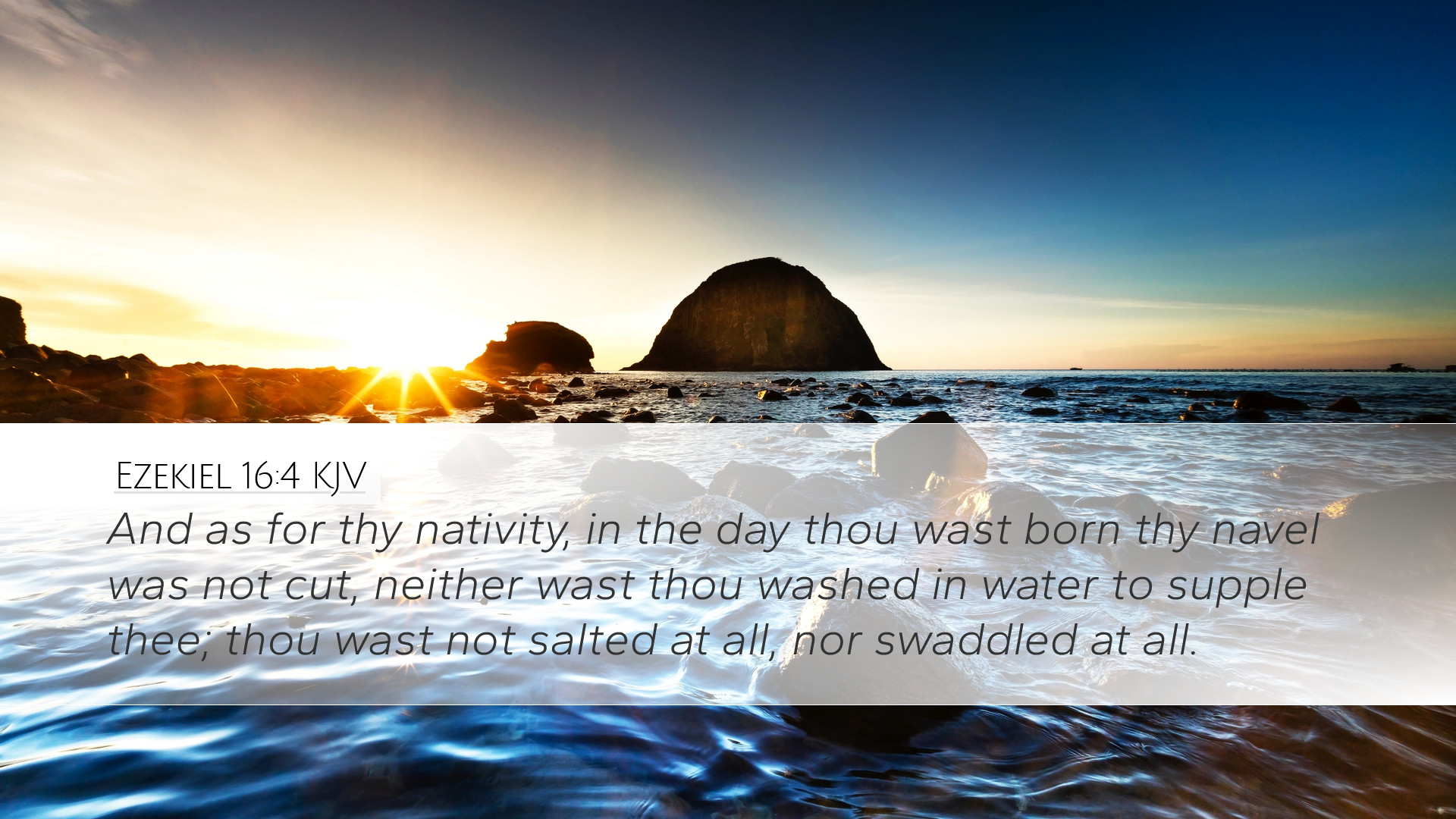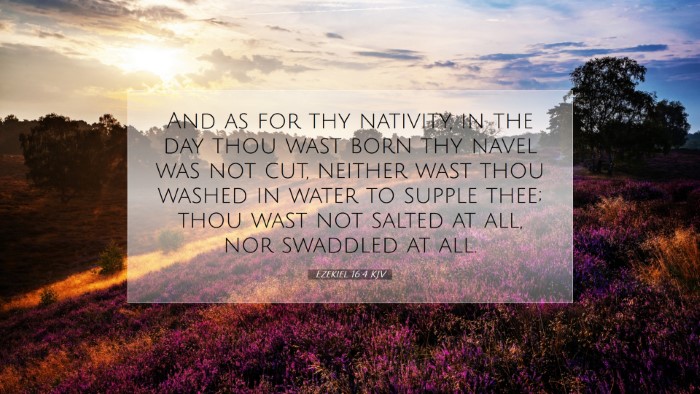Bible Commentary on Ezekiel 16:4
"And as for thy nativity, in the day thou wast born thy navel was not cut, neither wast thou washed in water to supple thee; thou wast not salted at all, nor swaddled at all."
This verse from the Book of Ezekiel symbolizes the abject state of Israel during its inception. The imagery used by the prophet Ezekiel demonstrates not only the physical state of a newborn child but also the spiritual and moral neglect of Israel during its formative years. Through various public domain commentaries, we can uncover deeper insights that resonate with pastors, students, theologians, and Bible scholars alike.
Overview of the Verse
Ezekiel 16:4 presents a poignant picture of abandonment and neglect. The prophet speaks metaphorically of Jerusalem's birth, emphasizing the utter lack of care and attention it received. This neglect serves as an illustration of God's tender concern for His people contrasted with their unworthiness.
Commentary Insights
-
Matthew Henry's Commentary
Matthew Henry elucidates that the verse reflects a state of being 'unloved and unvalued' from birth. The terms "navel not cut" and "not washed in water" suggest that Israel was brought into the world in a state of neglect, highlighting God's grace in choosing her despite this lack of worthiness.
He emphasizes the importance of the rituals and customs that signify care and love for a newborn, which were completely absent. This absence underscores God's sovereignty in calling the unworthy and making them His own.
-
Albert Barnes' Notes
Albert Barnes further explains the implications of these neglectful actions. He notes that the navel, an essential part of a newborn, symbolizes the connection to the mother and life. By saying it was not cut, it indicates an absence of nurturing care.
Barnes points out that the imagery extends to the neglect of both physical and spiritual care, drawing parallels to divine displeasure at Israel's rebelliousness. This neglect leads to spiritual desolation, thus highlighting the need for regeneration and spiritual rebirth.
-
Adam Clarke's Commentary
Adam Clarke elaborates on the symbolism by interpreting "salted" as a means of preservation and "swaddled" as an indication of care. He argues that these elements are crucial for a child's well-being and development.
Clarke’s insights reveal that God is not merely detailing a historical account but is also lamenting the consequences of Israel's unfaithfulness and idolatry. He underscores that neglect on such a fundamental level leads to societal decay and spiritual estrangement from God.
Theological Implications
Theologically, Ezekiel 16:4 challenges readers to explore the profound themes of grace, identity, and redemption. The metaphor of an abandoned child resonates deeply within the Christian understanding of salvation, where God's grace intervenes in the bleakest of situations.
As believers, one must reflect on the state of their spiritual birth—recognizing how the grace of God cleanses, nurtures, and equips the individual for communal and spiritual life. The passage illustrates the transformative power of God in juxtaposition to human neglect.
Practical Applications
- Reflection on God’s Grace: Pastors and leaders can focus on how God’s grace is evident in their lives and congregations despite previous neglect or unworthiness.
- Awareness of Spiritual Neglect: This verse calls to attention the necessity of care—spiritual nurturing in communities may be as crucial as physical care for new life.
- Importance of Nurturing: The insights drawn from this verse can encourage church leaders to implement systems for nurturing spiritual growth among the congregation.
- Call to Repentance: Recognizing areas of spiritual neglect within communities can lead to genuine moments of repentance and a return to God’s intended path.
Conclusion
Ezekiel 16:4 serves as a profound reminder of the depths of God's mercy and the importance of care—both divine and communal. It asks each individual to reflect on both their origins and their development in faith. The neglect illustrated within this verse not only emphasizes the dire condition of Jerusalem but also the indomitable nature of God's grace that calls forth restoration.


